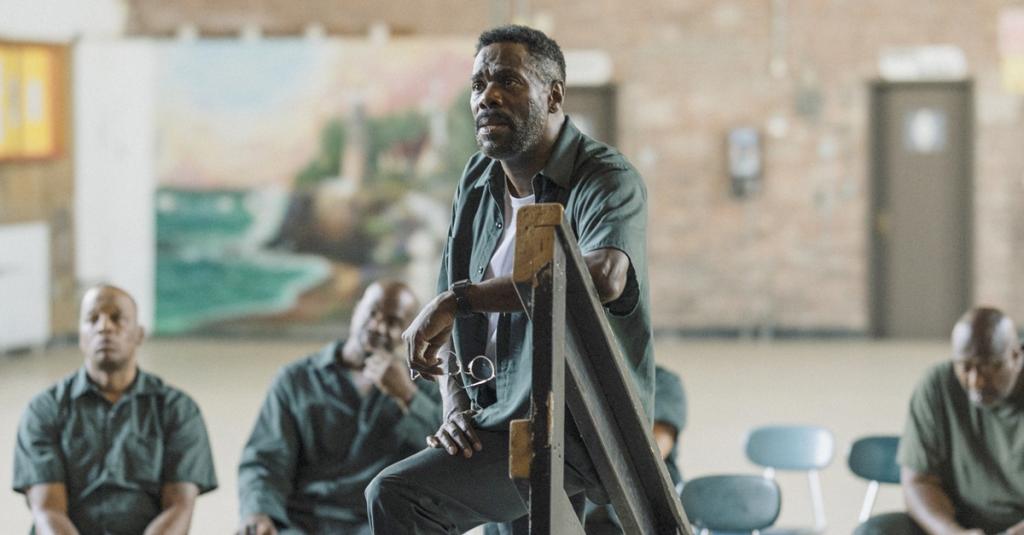When I attended a screening of the drama Sing Sing, currently in theaters, I didn’t know, or maybe just remember, that 85%+ of the cast members are former prison inmates, playing versions of themselves.
To everyone’s credit, I wouldn’t have known if nobody had ever told me.
Independently produced, Sing Sing came to distributor A24 through exposure at the 2023 Toronto International Film Festival.
What Is Sing Sing About?
The story is based on the life and experiences of John “Divine G” Whitfield (played by Colman Domingo in the film), who spent more than two decades in New York State’s Sing Sing Maximum Security Prison.
Whitfield, an alumnus of New York’s High School for the Performing Arts (made famous in the Fame movie and TV show), was a founding member of the Rehabilitation Through the Arts (a k a RTA) program.
Begun at Sing Sing in 1996, it allows inmates to participate in theater, dance and other forms of the arts. This helps their personal development and gives them emotional and practical tools to prevent recidivism (the program claims that only 3% of its participants return to prison).
In the film, Whitfield — also struggling to overturn his conviction — is a standout performer and a major force in the group.
When inmate Clarence “Divine Eye” Maclin (playing himself) reluctantly joins the group, it unsettles the dynamic. This results in the creation of an original comedic pastiche called Breakin’ the Mummy’s Code (an Egyptian prince, Hamlet, pirates and Freddy Kreuger show up).
Paul Raci (Sound of Metal) plays the play’s writer and director, Brent Buell — based on the real man — who must navigate not only the cast’s emotions and talent but also the realities of prison life.
Before the film’s end, both Whitfield and Maclin have found both joy and pain, and a form of redemption.
Is Sing Sing Worth Seeing?
The film is raw (it is rated R) but not exploitative. It casts a sympathetic eye on men who find on the stage a path to parts of themselves they may never have explored before.
Unlike many prison films, it’s not powered by violence. There’s a death, but it’s from something more insidious, and more universal, than a fist or a shank.
Overt expressions of faith are few (one inmate does wear a Cross and has a Rosary) but it’s hard to deny the spiritual power inherent in both the drama of the film itself and the onstage drama.
Shot largely in decommissioned prisons (sometimes in high summer, without air conditioning), Sing Sing looks authentic and doesn’t romanticize or excessively demonize prison.
The inmates are given their full humanity, but, at the same time, the guards are not portrayed as inhuman monsters (as too often happens).
Sing Sing balances real-life experiences of RTA participants with fictional elements, and while it offers a heartwarming moment at the end, it’s not overly sentimental.
RTA truly changed the life of Whitfield, who told Rolling Stone:
Whitfield, who served more than 24 years behind bars, refused to let Sing Sing leave him bitter. During his time there, he wrote several novels and screenplays, and earned his Bachelor’s degree in behavioral science and Master’s degree in theology. “I was like, ‘I’m not going to fall victim to this,’” he says. “‘I’m not gonna let the system further destroy me by me helping destroy myself.’”
In addition to serving as a creative consultant (with Maclin), Whitfield is also credited as a writer and producer on Sing Sing.
Sing Sing Had an Unusual Way of Paying Everyone
Director Greg Kwedar — who co-wrote with filmmaking partner Clint Bentley, from a story by himself, Bentley, Maclin and Whitfield — employed an unusual financial model.
From The Hollywood Reporter:
The duo [of Kwedar and Bentley] have directed, written and produced two films — Sing Sing, out this weekend via A24, and 2021’s Jockey — using a model that sees everyone who works on the film, from the PAs to the director to the star at the top of the call sheet, paid the same wage.
Additionally, everyone involved in the production above and below the line received equity. Now, they are starting a company, Ethos, with the goal of using their model to help other independent filmmakers do the same.
Domingo told The Hollywood Reporter:
It just made sense to me. They presented a couple of ideas once that had me attached. They could go out to studios, a standard way to go, but then they also presented this community-based model that I was intrigued.
The fact we are using people’s stories that they’re giving up, they can be a part of themselves, they should have ownership. It felt very new and unique, the idea of having everyone above and below the line share equity.
Art Delivers the Goods in Sing Sing
It’s not unusual for filmmakers to make films about making films (or plays, as in this case). In their world, art dominates their experience and is considered utterly transformative.
But in the rest of the world, it’s only one factor, along with more mundane pursuits (like starting a business, farming, receiving health care, learning a trade, getting an education, etc.) that can improve society.
Putting on a show may be the answer to all questions in a movie, but it’s usually not that easy in the reality.
In this case, though, it’s obvious that RTA offers a vital pathway for inmates trapped in a cycle of crime and violence, and at the mercy of the justice system, to open their hearts and minds and transform their lives.
Sing Sing is also about the ways in which building community — regardless of what it’s built around — can heal wounded souls, no matter where they are.
Click here to learn more and find tickets.
Image: Colman Domingo in Sing Sing/A24
Don’t miss a thing: Subscribe to all that I write at Authory.com/KateOHare.













